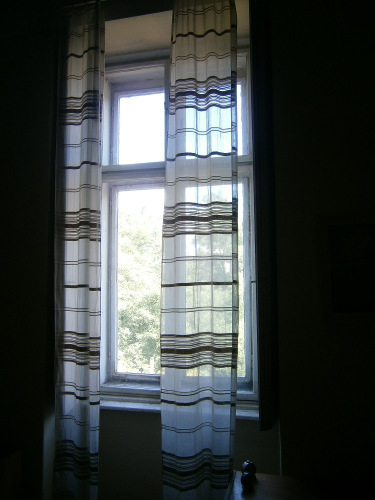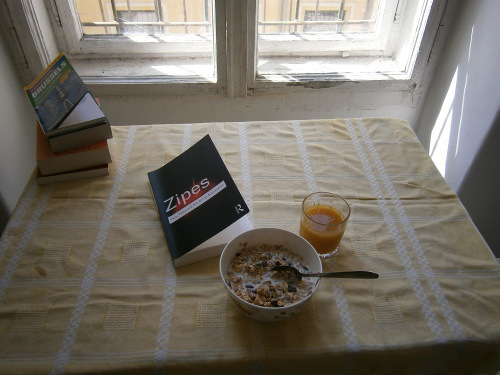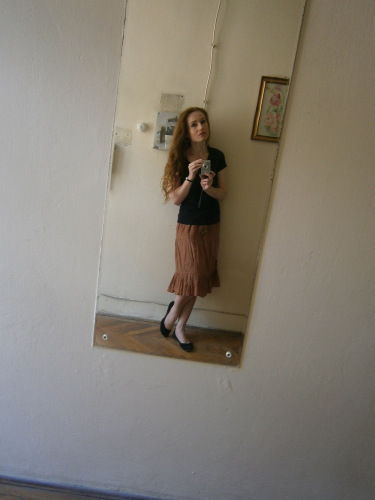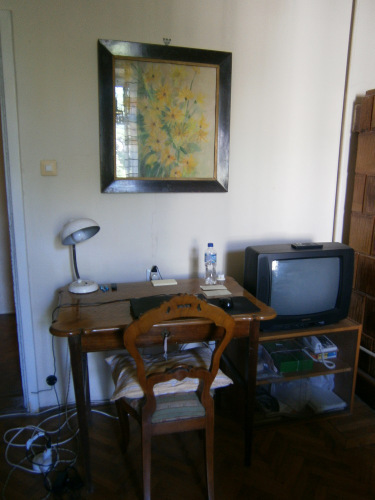Dreaming and Writing
I’ve been writing down my dreams. Or trying to, because of course dreams start to slip away as soon as you wake up.
The reason I’ve been writing them down is that I’ve been reading books on myths and fairy tales, some from a psychoanalytic perspective, and they speak of dreams as emanating from the unconscious, of containing unconscious material that we can access and bring to light. And I’ve been wondering if this is true, if dreams contain important information rather than simply being random collections of images reprocessed from our conscious life. I’ve wanted to find out for myself.
The images in this blog post are from my mornings in Budapest. The first is of morning light coming in through the very tall windows of my grandmother’s apartment. The apartment building was built in the 1840s, I’ve been told. The ceilings are very high, about twenty feet, I think. So these windows are much taller than they look in the photograph. The trees I see through the window are in the park around the Nemzeti Múzeum.
For a long time, I avoided paying attention to my dreams, because what I remembered were the unpleasant ones. And I dream vividly, in intense detail, so the unpleasant ones were very unpleasant. I didn’t want to remember them.
But since I arrived in Budapest, I’ve kept a notebook next to my bed, and when I wake up, I jot down whatever I remember. Not in detail, since my dreams are too detailed to capture in their entirety. But jotting down enough information that I remember what the dream was about.
This is my breakfast: muesli, peach juice, and theorizing the literary fairy tale. The view is out the kitchen window into the courtyard, which I think used to be where the carriages drove in.
So far, I’ve learned a couple of things. One is that without an alarm, I naturally sleep nine hours a night. So sleeping five hours, which is the most I got some night during the semester, is probably not a good idea, is it? I think I need sleep, need a significant amount of sleep, and when I don’t get what I need, I’m not healthy or even happy. So that’s a useful lesson in itself.
The other thing I’ve learned is that I dream many times a night, many dreams: each time I wake up, I remember a different one. (Since the daylight comes in, I wake up several times in the morning, and if I’m still tired, I go back to sleep. I love the daylight coming in. I hate drawn curtains, hate to wake in darkness. When that happens, I always feel groggy.)
I can usually only remember the last dream or two, but I know there have been many, that I’ve dreamed many dream lives in the course of a night.
This is me in the distorting hall mirror, ready to go out for the day. The weather here in Budapest has been wonderful: warm, sunny. It’s definitely summer skirt weather, whereas in London a week ago I was wearing a fleece jacket and boots.
And as I expected, my dreams are intense, detailed. While I’m in the dream, I don’t remember that I’m dreaming, that I have another life, a life I call “real.” For the time I’m in the dream, the dream is my life, my reality. This is disconcerting when I wake, because I have to adjust and remember that I’m now in my “real” life. I have to remember what day it is, where I am in the world.
This is where I want to make a connection with writing (after all, I called this blog post Dreaming and Writing). I don’t know if it’s like this for other writers, but when I write, it’s as though I’m having a waking dream. I’m observing the story I’m telling as though it were reality, as though I were in it (although not participating in it). It’s happening all around me. I’m immersed in the story.
This is my writing desk. It’s not exactly ergonomic! I have to put a pillow on the chair to raise me up enough so I can type comfortably. I don’t think that television has been on since the 1970s.
When I emerge from writing, it’s an experience as disconcerting as waking up, as emerging from a dream. I have to try and remember what day it is, where I am in the world. It’s as though I’ve spent several hours in a version of sleep.
So what does all this tell me? Well, I’m going to keep trying to write down my dreams. I want to see what else I can learn about them. But what it suggests to me is that there is something profoundly complicated about the creative process. When I’m being creative, I’m putting myself into a certain mental state, changing what my brain is doing and how it’s relating to the world in a profound way. That seems important.
It also suggests that writers are very strange people. I suspect that artists, dancers, musicians all go through a version of the same thing: that they change mental states while creating and performing. What does it mean to be that sort of person? What does it mean to live with that sort of person? It must be difficult . . . (Writers can be difficult people to live with. I know that I am never entirely there, wherever I am. Part of me is always somewhere else, particularly when I’m working on a project, as I am now.)
And here is my table in the internet cafe down the street. This is where I am now, typing this blog post. That is a small latte, and it is genuinely small: about half the size of a latte in London or Boston. But in London, I can drink several small lattes throughout the day. In Boston, I can drink two at most, because the coffee there is so much stronger. And here in Budapest? This is my limit! Even the caffeine in this small latte is almost too much for me. But it’s the best coffee I’ve ever had, anywhere, ever.
The truth is, and I don’t know whether this is a good truth or not, that I don’t write to produce stories. Or for any of the superficial reasons: fame, fortune (neither of which are guaranteed anyway). No, the reason I write is that it’s always been my way of getting there, to that particular mental place where I’m living in a dream. Where my brain is functioning in a particular way. My desire to go there is like an addiction, and I suspect if I didn’t write, I would start going all wrong, the way people go wrong if they don’t dream.
Ray Bradbury said, “You must stay drunk on writing so reality cannot destroy you.” I think that’s sort of what I’m talking about . . .










